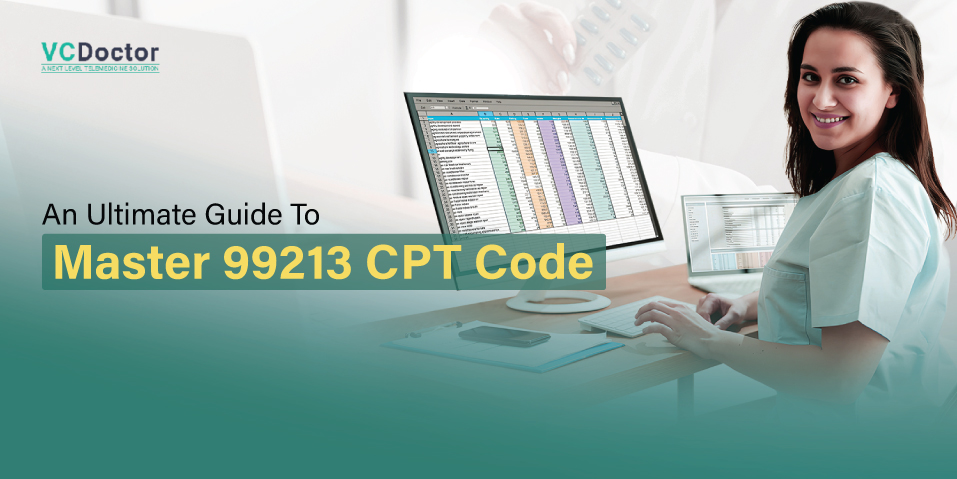An Ultimate Guide To Master 99213 CPT Code
Did you know? The 99213 CPT Code is one of the most frequently used codes in medical billing for office or outpatient visits, and it is specifically used for established patients. It’s very essential for healthcare professionals to understand this CPT code for accurate billing and ensure proper reimbursement.
As many healthcare policies and billing practices have recently changed, it’s become more important to know the updated 99213. So, if you want to learn about CPT Code 99213 in detail, then we’ve got you covered.
In this article, we will understand everything about the CPT Code 99213, its uses, its importance in telehealth software, and much more.
So, without any further delay, let’s dive in!
Table of Contents
- What Is CPT Code 99213?
- Key Features of CPT Code 99213
- What does the 99213 CPT Code cover?
- What Is 99213 CPT Code Used For?
- Who uses the 99213 CPT code?
- How to Determine the Use of 99213 CPT Code?
- How does the 99213 CPT code impact insurance billing and reimbursement?
- What is the Importance of CPT Code 99213?
- Understanding the Documentation Requirements for the 99213 Code
- What are the key elements that should be included in the documentation?
- 99213 CPT Code Reimbursement Rates in 2024
- Common Mistakes to Avoid in Billing CPT Code 99213
- Recent Updates and Changes to CPT Code 99213
- CPT Code 99213 vs 99214 vs 99215: Key Difference
- Conclusion
- FAQs
What Is CPT Code 99213?
CPT Code 99213 is an evaluation and management (E/M) code that is commonly used by healthcare professionals for billing a specific type of outpatient medical visit. However, it especially applies to established patients.
This means those patients who have been seen before by the healthcare provider and now come for their next visit in an office for moderate care because the CPT Code 99213 is associated with a moderate level of complexity and its used office visits, which require modern medical care and management of patient’s conditions.
This code 99213 is described as a “Level 3 Established Patient Office Visit”, which means this visit usually involves:
- A detailed history
- A detailed physical examination
- Medical decision-making of moderate complexity
These visits usually last around 20-29 minutes, where a patient requires moderate attention, such as managing chronic conditions or discussing new health concerns that require some medical decision-making. For healthcare professionals, this code is essential for reimbursement failure telehealth platforms after the care they provide.
Get Your Telehealth Software Development
Key Features of CPT Code 99213
| Code Type | Description |
| CPT Code | 99213 |
| Code Level | Level Three |
| Complexity Level | Moderate |
| Visit Duration | 20-29 minutes |
| Services | Evaluation and management, diagnosis, treatment, counseling and education |
One of the crucial reasons for using the 99213 carefully is to ensure healthcare providers get reimbursement properly for the care they provide. Plus, staying updated with recent CPT codes is also important to know what needs to be documented, and getting expert advice can help them handle the challenges of medical billing and coding easily.
What does the 99213 CPT Code cover?
The 99213 CPT Code represents evaluation and management (E/M) services provided by healthcare professionals. This code is used to document and bill level three office visits, which include face-to-face encounters with patients and treatment of new or existing problems. This code is appropriate when the healthcare provider spends 20-29 minutes with face-to-face interaction with the patient.
Here are some key components of the 99213:
1. Evaluation: The medical visit includes an analysis of the patient’s medical history, current symptoms, and physical examination to find a diagnosis and treatment plan.
2. Complexity: The 99213 CPT Code is used for a moderate level of decision-making. This means this code is appropriate for those patients who have moderate symptoms or stable chronic conditions that require regular monitoring and management.
3. Time: The typical time spent on the medical visit between 20-29 minutes leads to 99213.
4. Management: Healthcare professionals mainly focus on managing a patient’s health condition, including prescribing medications, ordering tests, providing education, counseling, and coordinating care with other providers.
5. Documentation: Accurate documentation is essential when using the CPT 99213 Code. Which describes the reason for the visit, examination, treatment provided, and patient’s response to the treatment.
Pro Tip: Healthcare professionals make sure the visit’s complexity and time align with the 99213 requirement for accurate documentation, billing, and reimbursement.
What Is 99213 CPT Code Used For?
The 99213 is used by healthcare professionals to bill for mid-level office or outpatient visits with established patients. Some of the following situations where this Code can be applied:
- Follow-up visits for chronic conditions
- Post-operative visits in plastic surgery to track recovery progress and manage complications
- Routine check-ups for ongoing treatments
- Evaluating and managing new symptoms that don’t require extensive testing
Who uses the 99213 CPT code?
The 99213 is the most commonly used code in the healthcare industry. Here’s the breakdown of who uses this code:
1. Healthcare Providers: The 99213 is used by healthcare providers, including doctors, nurses, practitioners, and other healthcare workers, to check and manage patients’ conditions during office visits.
2. Insurance Companies: Health insurance companies also use this CPT code to process claims and decide how much to pay to the provider based on the visit and service provided.
3. Patients: Patients usually don’t use this CPT code directly, but it helps them to ensure that the medical billing is clear, fair, and standardized.
4. Medical Coders: All the professional medical coders who specialize in medical billing use this code to accurately document the service provided by the healthcare professionals. So that the providers get the right amount for billing and reimbursement.
5. Government Agencies: Government Organizations also use this CPT code to set payment rates and ensure healthcare services are used correctly.
How to Determine the Use of 99213 CPT Code?
In order to use the 99213 CPT code accurately, the professional needs to do some careful assessments, including the patient’s condition, problem addresses, and level of risk. Based on these data, healthcare providers can come up with accurate codes. To use the 99213 CPT Code accurately, here are some following factors that healthcare providers must consider:
1. Evaluate Patient’s Condition: First, healthcare providers need to check the patient’s condition and level of complexity, whether it’s low or moderate, and then see if it matches with the 99213 CPT Code.
2. Identify Problems Addressed: Providers need to note down all the specific medical issues patients have during the visit via the best telehealth apps, including ongoing or new concerns.
3. Determine the Level of Risk: Evaluating the level of risk is also essential, considering the potential complications and the required further tests.
4. Review Relevant Data: Professionals need to consider patients’ data during the visit on white label telehealth, including lab results for previous medical records, to understand the level of decision-making required.
5. Create Comprehensive Documentation: Make sure to record everything, including the patient’s medical history, exam findings, decision-making process, treatments provided, etc. All these documents will be supported during the use of the 99213.
How does the 99213 CPT code impact insurance billing and reimbursement?
Here’s how the CPT Medical Code 99213 affects insurance billing and payments:
1. Insurance Coverage: Most of the insurance plans cover the 99213 CPT code. This means if a healthcare professional uses this code, then it’s more likely to pay for the service.
2. Documentation: In order to get paid properly, documentation plays a major role. You need to clearly record what happened during the visit and include the patient’s details, such as issues, medical history, and exam results because documentation helps you justify the use of the 99213 CPT code.
3. Correct Coding: Using the right code is important. If a wrong CPT code is used, then the claim can be rejected. So, make sure to use the right CPT code during insurance claims, and ensure that the 99213 CPT code matches the requirements.
4. Impact on Earnings: Using the procedure code 99213 boosts your earnings, and accurate documentation leads to the right payment for your service.
5. Payment Amounts: The amount you’ll get paid for the 99213 CPT code can range between $70-$100 for an office visit CPT code.
6. Submitting Claims: You need to submit claims to insurance telemedicine software companies so that the entire process is done on time and get paid quickly.
What is the Importance of CPT Code 99213?
There are numerous reasons to use 99213 CPT codes, especially if you can get proper reimbursement for your visits with established patients. Here are some key reasons why this code is important for telemedicine software providers:
- Accurate Billing: Using the 99213 can help you do accurate billing, which lowers the chance of insurance claims being rejected.
- Payment: Use this CPT code to ensure you get paid the right amount for outpatient visits with established patients who need a moderate level of care within 20-29 minutes of your time.
- Patient Care: It also supports good documentation, which helps providers keep track of patients progress and provide quality care.
- Regulation Compliance: It also helps the professional follow the rules and regulations properly.
Understanding the Documentation Requirements for the 99213 Code
When you’re using the 99213, then it’s very important to understand the documentation that is required for this code. Here are some key documents required:
1. Medical Necessity: Healthcare providers need to explain why the visit was needed. Whether its patient is sick, injured, or has some contributing conditions.
2. Time-based Documentation: Providers need to spend 20-29 minutes with the patient, which is surely required to help them with decision-making.
3. Established Patient: Providers need to use this code if their patients have been to their office in the last three years.
4. Level of Complexity: This code is specifically for those visits that have moderate complexity for evaluation and management services. The documents must also reflect the complexity level based on the patient’s medical history, examination results, and decision-making.
5. Relevant Documentation: You need to come up with other relevant information about why this code is used, including the patient’s current health issues, medical history, exam results, and treatment plan.
What are the key elements that should be included in the documentation?
Here are some key elements that should be included in the documentation while using the 99213 CPT code:
- Chief Complaint – To mention the reason why the patient came in.
- Past Medical, Family, and Social History – This includes the patient’s medical history, family health background, and social habits.
- History of Present Illness (HPI) – Describe the patient’s current symptoms or issues.
- Physical Examination Findings – Record the results of the physical examination.
- Time Spent – Note down the time spent with the patient.
- Medical Decision Making (MDM) – Explain how the provider decided on the diagnosis and treatment.
- Review of Systems (ROS) – Note down additional autism or concern in different body systems.
99213 CPT Code Reimbursement Rates in 2024
In 2024, the medicare reimbursement rate for the CPT Code 99213 is $90.88. It’s not as high as 99214 vs 99213 CPT code because of its low MDM and time requirements. Still, professionals don’t need to miss out on opportunities where they can use the 99213.
Common Mistakes to Avoid in Billing CPT Code 99213
Here are some common mistakes that you need to avoid while billing 99213 Code:
- Not the Right Documentation: Sometimes, professionals fail to prove how long they’ve spent with patients, what they did with them, etc.
- Incorrect Use of Modifiers: Not using suitable modifiers when necessary.
- Patient Status: Using 99213 CPT code description for new patients instead of established ones.
- Upcoding or Downcoding: Misrepresenting the level of service provided can be another mistake.
Recent Updates and Changes to CPT Code 99213
CPT Codes like 99213 are updated regularly, and it’s essential for healthcare providers to stay up-to-date with these changes to ensure they are documenting, coding, and billing accurately. By staying up-to-date with recent changes, healthcare providers can ensure that they follow the given rules and documentation properly and lead to patient service.
CPT Code 99213 vs 99214 vs 99215: Key Difference
| CPT Code | History/Exam | Medical Decision Making (MDM) | Encounter Time (Minutes) | Reimbursement Rate (2024) |
| 99213 | Medically appropriate history and/or examination | Low | 20 | $90.88 |
| 99214 | Medically appropriate history and/or examination | Moderate | 30-39 | $128.16 |
| 99215 | Medically appropriate history and/or examination | High | 40+ | $180.42 |
Looking for white label telemedicine solution?
Conclusion
99213 is one of the important and frequently used codes for medical billing and reimbursement. However, recent updates in CPT codes require a new understanding of this code. We hope this guide helps you understand everything about the CPT Code 99213, its use, requirements, importance, documentation, and common mistakes to avoid. To know more about the CPT Code 99213, you can get in touch with experts at VCDoctor, a telemedicine app development company.
FAQs
Q. What does CPT code 99213 cover?
The 99213 is mainly used for office billing for outpatient visits with established patients, which require a moderate level of care with low complexity.
Q. What types of services fall under CPT code 99213?
The 99213 CPT Codes include reviewing a patient’s history, performing a physical examination, and managing the patient’s condition under this code.
Q. How long does a 99213 visit usually last?
The typical duration of 99213 ranges between 20-29 minutes for face-to-face time white label telemedicine platforms with the established patient.
Q. Who typically uses CPT code 99213?
Most healthcare providers, including doctors, nurses, and physician assistants, are using this code.
Q. How can medical professionals keep track of updates to CPT code 99213?
By regularly checking the American Medical Association (AMA) and other official materials is the best recommendation to stay updated with the CPT codes.
Q. What distinguishes CPT code 99213 from 99214?
The key difference between 99213 and 99214 is the level of care and complexity. Because 99213 is for low complexity and 99214 is for moderate complexity.
Q. What are the consequences of using the wrong CPT code?
Using the wrong CPT code can result in claiming rejections, reduced payments, or compliance issues.
Q. How does the CPT code system function?
The system follows a medical procedure for billing and documentation and ensures using these CPT codes for the operations.




